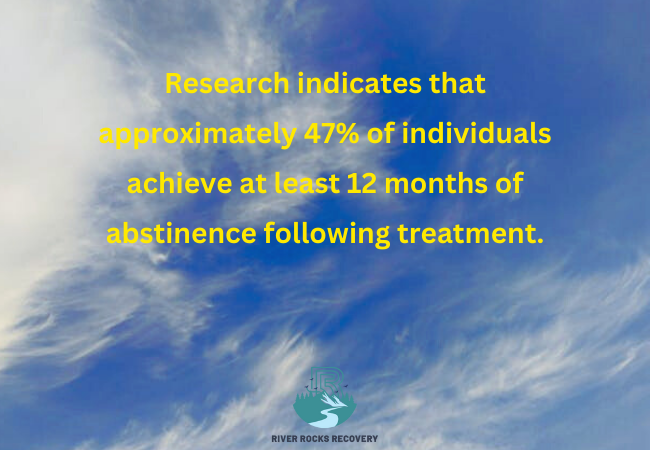When individuals decide to seek help for alcohol addiction, one of the most common concerns is how long alcohol rehab will take. The duration of rehab varies based on individual needs, the severity of addiction, co-occurring mental health conditions, and the type of treatment program. While some individuals complete rehab within a few weeks, others may need several months or even longer to achieve lasting sobriety.
At River Rocks Recovery, we offer comprehensive addiction treatment programs in Ohio to help individuals break free from alcohol dependence and build a healthy, sober life.
In this detailed guide, we will explore:
- The different stages of alcohol rehab
- Typical timelines for alcohol rehab programs
- Factors influencing rehab duration
- Why long-term recovery requires ongoing support
- How to choose the right rehab program for your needs
The Different Stages of Alcohol Rehab
Alcohol rehab is typically broken down into several phases, each focusing on specific aspects of recovery. Understanding these stages can help individuals and families make informed decisions about the treatment process.
1. Alcohol Detox (5-10 Days)
- The first step in rehab for many individuals is medically supervised detox, which allows the body to eliminate alcohol safely.
- Detox is necessary for individuals with physical dependence, as withdrawal symptoms can range from mild headaches and nausea to severe seizures and delirium tremens (DTs).
- Detox typically lasts between 5 to 10 days, depending on individual health, alcohol usage history, and withdrawal severity.
2. Inpatient or Residential Rehab (30-90 Days)
- After detox, many individuals enter a structured inpatient rehab program, where they receive 24/7 medical supervision, therapy, and relapse prevention training.
- The length of inpatient rehab varies:
- 30-day programs provide intensive therapy and stabilization.
- 60-90 day programs offer a deeper focus on behavioral therapy, coping skills, and long-term recovery planning.
3. Partial Hospitalization Program (PHP) (2-4 Weeks)
- PHP is a step-down program from inpatient rehab, offering structured care during the day while allowing individuals to return home in the evenings.
- PHP typically lasts 2 to 4 weeks and includes therapy, counseling, and medication management if necessary.
4. Intensive Outpatient Program (IOP) (8-12 Weeks)
- IOP allows individuals to attend therapy and treatment sessions multiple times a week while maintaining daily responsibilities.
- This program lasts 8-12 weeks, but some individuals benefit from longer-term IOP participation.
5. Outpatient Program (OP) (Several Months to a Year or More)
- OP provides continued support with therapy sessions once or twice a week.
- Many individuals remain in outpatient treatment for a year or longer to strengthen their sobriety.
Typical Timelines for Alcohol Rehab Programs
| Treatment Type | Duration | Best for |
|---|---|---|
| Alcohol Detox | 5-10 Days | Individuals experiencing withdrawal symptoms |
| Inpatient Rehab | 30-90 Days | Moderate to severe alcohol addiction |
| PHP | 2-4 Weeks | Individuals transitioning from inpatient rehab |
| IOP | 8-12 Weeks | Those needing structured therapy while living at home |
| OP | Several months to a year | Long-term recovery support and relapse prevention |
Each individual’s recovery journey is unique, and treatment duration can vary based on progress, medical needs, and external support systems.
Factors That Influence the Duration of Alcohol Rehab
1. Severity of Alcohol Addiction
- Individuals with mild alcohol use disorder may require only detox and outpatient care, while those with severe dependence may need 60-90 days of inpatient treatment followed by long-term outpatient care.
2. Co-Occurring Mental Health Disorders
- Anxiety, depression, PTSD, and bipolar disorder often co-exist with alcohol addiction.
- Dual diagnosis treatment can extend rehab duration as individuals require therapy for both addiction and mental health challenges.
3. History of Relapse
- Individuals with multiple relapses may need longer treatment plans, including sober living programs and long-term outpatient care.
4. Support System and Home Environment
- Those with supportive families and stable home environments may progress more quickly through rehab.
- Individuals in toxic environments with triggers for substance use may benefit from extended inpatient care or sober living programs.
Why Long-Term Recovery Requires Ongoing Support
While rehab lays the foundation for recovery, long-term sobriety requires continuous care. Some key aftercare programs include:
1. Sober Living Programs
- Structured, substance-free housing for individuals transitioning from rehab.
2. 12-Step & Peer Support Groups
- Alcoholics Anonymous (AA), SMART Recovery, and other support groups provide long-term community and accountability.
3. Individual & Group Therapy
- Continued counseling and therapy sessions address emotional and psychological challenges.
4. Relapse Prevention Planning
- Recognizing triggers, developing coping mechanisms, and stress management strategies are crucial for sustained recovery.

How to Choose the Right Alcohol Rehab Program
Choosing the right rehab program depends on individual needs, medical history, and recovery goals. Consider the following:
- How severe is the alcohol addiction? Severe cases may require 60+ days of inpatient rehab.
- Do you have a stable support system at home? If not, consider sober living programs or extended rehab stays.
- Are there underlying mental health issues? Co-occurring disorders require dual diagnosis treatment.
- What are your work or family obligations? PHP, IOP, and OP programs allow flexibility for those who need to balance responsibilities.
A professional addiction treatment assessment can help determine the best path for each individual.
How River Rocks Recovery Can Help
At River Rocks Recovery, we provide comprehensive alcohol rehab treatment in Ohio, guiding individuals through detox, rehab, and aftercare for lasting recovery. Our services include:
- Medically Supervised Detox – Safe withdrawal management
- Partial Hospitalization Program (PHP) – Intensive daytime therapy
- Intensive Outpatient Program (IOP) – Structured support while returning to daily life
- Outpatient Program (OP) – Long-term therapy for relapse prevention
- Sober Living Options – Supportive, substance-free housing
We recognize that every recovery journey is unique, and our dedicated team provides personalized treatment plans to meet each individual’s needs.
Conclusion
The question “How long does alcohol rehab take?” does not have a one-size-fits-all answer. The duration of rehab depends on individual needs, addiction severity, co-occurring mental health conditions, and commitment to long-term recovery. While some individuals may complete rehab in 30 days, others may require 60-90 days of inpatient care followed by months or years of outpatient support.
What truly matters is not just the length of treatment, but the quality of care and the commitment to ongoing recovery. Rehab is just the first step in building a sober, fulfilling life. Continued therapy, peer support, sober living environments, and relapse prevention strategies are crucial to maintaining long-term sobriety.
At River Rocks Recovery, we understand that recovery is a personal journey, and we are committed to providing the right treatment, support, and tools to help individuals succeed. Whether you need detox, inpatient rehab, partial hospitalization, intensive outpatient treatment, or long-term outpatient care, our team is here to guide you through every step of your recovery. Call River Rocks Recovery at 888.905.6281 today to take the first step toward sobriety. If you or a loved one is struggling with alcohol addiction, don’t wait to seek help. Your future is worth fighting for.
FAQ About Alcohol Rehab Timelines
How long does alcohol rehab typically take?
The length of alcohol rehab depends on the severity of addiction and the type of treatment program. On average:
- Detox: 5-10 days
- Inpatient Rehab: 30-90 days
- Partial Hospitalization Program (PHP): 2-4 weeks
- Intensive Outpatient Program (IOP): 8-12 weeks
- Outpatient Program (OP): Several months to a year
Is 30 days enough for alcohol rehab?
A 30-day program can be effective for some individuals, especially those with mild to moderate addiction and strong support systems. However, many benefit from longer-term treatment to build stronger relapse prevention skills and emotional stability.
What is the shortest rehab program available?
Some detox-only programs last 5-10 days, but detox alone is not considered full treatment. The shortest structured rehab program is typically 14-30 days, which includes medical care and therapy.
Can I go to rehab while still working or taking care of my family?
Yes! Outpatient programs (IOP & OP) allow individuals to receive treatment while maintaining work, school, or family responsibilities. These programs offer flexible scheduling, making it easier to integrate treatment into daily life.
What factors affect how long I’ll need to stay in rehab?
Several factors influence rehab duration, including:
- Severity of addiction (longer use may require extended treatment).
- Co-occurring mental health disorders (depression, anxiety, PTSD, etc.).
- Previous relapses (chronic relapse cases may need more intensive care).
- Support system and home environment (toxic environments may require longer rehab stays or sober living options).
What happens after completing rehab?
After rehab, individuals should continue with aftercare programs, such as:
- Outpatient therapy (OP) for continued counseling and relapse prevention.
- Support groups like AA, SMART Recovery, or other peer support meetings.
- Sober living programs for structured, substance-free environments.




























